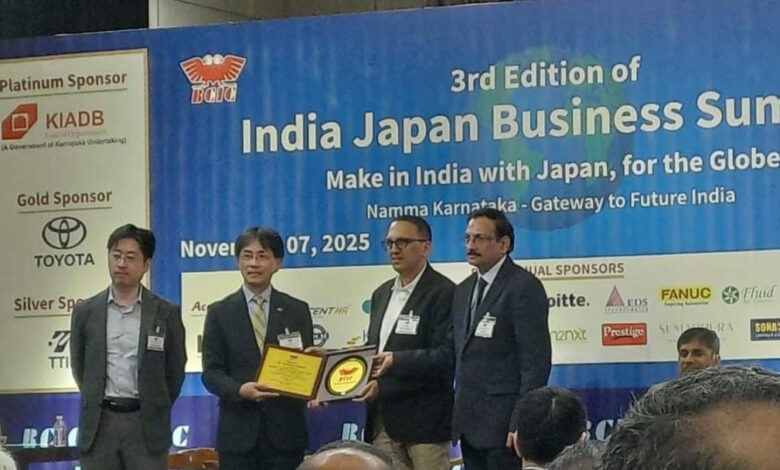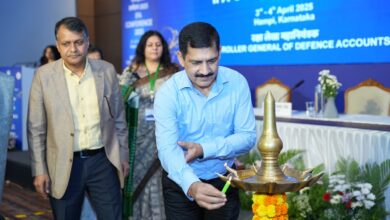‘Make in India with Japan’ Gains Momentum as 3rd Bilateral Summit Focuses on Practical Outcomes

The Bangalore Chamber of Industry and Commerce (BCIC) concluded the 3rd edition of the India–Japan Business Summit (IJBS), bringing together business leaders, government delegates and knowledge experts from both countries. The Summit was held under the theme ‘Make in India with Japan, for the Globe’ and focused strongly on strengthening cooperation in manufacturing, technology development and MSME-led industrial growth. While events of this scale often risk becoming symbolic, this edition centred its discussions on actionable collaboration, particularly around joint ventures, technology transfer and expanding access to global markets via India and Japan.
The event began with opening remarks from BCIC leadership, setting the tone for advancing India-Japan business relationships with continuity and practical outcomes. A key moment of the Summit was the announcement and demonstration of SMRJ’s Start-Up Portal, which aims to support business matching, innovation partnerships and market exploration between entrepreneurs and industry players from both countries. Representatives from the Government of Karnataka reiterated the state’s commitment to enabling Japanese investments and joint manufacturing initiatives, though it was acknowledged that regulatory complexity still remains an area needing ongoing refinement.
Speakers at the Summit included Mr. Tomohiro Kaneko, Executive Vice President of SMRJ and Mr. Satoshi Uchida, Director, Matching Support Division, SMRJ. Both emphasized the importance of building steady channels of exchange rather than one-time delegation visits. Dr. Selva Kumar, IAS, Principal Secretary, Commerce & Industries Department, Government of Karnataka and H.E. Nakane Tsutomu, Consul General of Japan in Bengaluru, addressed the gathering and discussed evolving strategies to support bilateral business relationships and long-term cooperation.
Dr. K G Suresh, Co-Chairperson – BCIC Japan Initiatives, who joined virtually said, “Our engagement with Japan has not been a one-off gesture, but a series of meaningful collaborative steps. Through seminars with Yukoma India Center, coordinated business visits and renewed partnerships such as our MoU with Osaka City, we have focused on action more than announcements. Recent interactions including meetings with the Mayor of Nagoya and industry delegations have aimed at strengthening city-to-city and business-to-business cooperation. As we prepare to welcome Saitama City early next year, we remain committed to expanding these partnerships with sincerity and shared purpose. I deeply appreciate the guidance and participation of our partners from Shinkin Chobank, the Consulate General and all colleagues who continue to work with dedication to bring India and Japan closer in practical and impactful ways.”
H E Nakane Tsutomu, Consul General of Japan in Bangalore, said, “Japan and India share a deep and mutually beneficial partnership across politics, diplomacy, security and economic cooperation. Prime Minister Modi’s recent visit to Japan reaffirmed Japan’s role as a trusted partner in India’s growth, resulting in key initiatives, including a target of 10 trillion yen in private investment and the Japan-India Human Resource Exchange Initiative. Karnataka, with its thriving IT and manufacturing sectors, continues to attract leading Japanese companies, now expanding even into Tier-2 and Tier-3 cities. I appreciate BCIC’s efforts in strengthening these ties through meaningful engagements and delegations. I hope our collaboration continues to create practical, impactful outcomes that benefit both nations.”
Mr. Tomohiro Kaneko, Executive Vice President, SMRJ, said, “SMEs are the backbone of Japan’s economy and we assist them in growth, market expansion and adapting to change. With Japan’s aging population, companies are increasingly looking to India, especially the Bangalore region, as a key partner for international collaboration. To support this, SMRJ and BCIC signed an MOU to facilitate business matching and partnerships. Through CEO Business Meetings and the JGTEC platform, many Japanese and Indian companies have already formed promising business ties. We will continue strengthening cooperation with BCIC and JETRO.”
Dr. Selva Kumar, IAS, Principal Secretary, Commerce & Industries Department, GoK, said, “Karnataka and Japan share a partnership built on trust, shared values and long-term commitment. Our collaboration goes beyond trade, reflecting a strategic relationship that continuously grows stronger. Karnataka has emerged as a preferred destination for Japanese investment, with over 500 companies contributing to sectors such as advanced manufacturing, clean energy and innovation. Initiatives like the Japanese Industrial Township in Tumkuru demonstrate our readiness to support future growth. Spread across more than 300 acres and located near Bengaluru’s industrial corridor, the village offers potential as a site for future Japanese investments in Karnataka. In September 2025, a high-level delegation from the Government of Karnataka visited Japan to explore such opportunities. We remain committed not merely to offering incentives, but to being a predictable, reliable and collaborative partner in Japan’s India journey. Let us continue building shared prosperity together.”
Mr. Satoshi Uchida, Director, Matching Support Division, JAPAN SMRJ (SME SUPPORT JAPAN), “Our focus is not merely on trade, but on building real collaboration between Indian and Japanese companies. Through the CEO Business Meetings, Indian businesses can declare their specific technology or business needs and we identify and introduce carefully matched Japanese partners who are capable of joint development, product co-creation and long-term ventures. These meetings connect decision-makers directly, supported by interpretation and when companies have multiple confirmed discussions, we even facilitate and support travel to Japan. Recent collaborations in Bengaluru and Osaka have resulted in concrete progress in sectors such as industrial machinery, automotive and housing, although meaningful partnerships always require sustained follow-up beyond the initial meeting.”
Mr. Sudeep S Dalvi, Senior Vice President, Director & Chief Communication Officer, Toyota Kirloskar Motor Pvt. Ltd., said, “Toyota’s work in India goes beyond manufacturing. By combining Japanese quality with India’s innovation, we strengthen India’s role in the global automotive value chain. Our focus is not only on products and production systems, but on people because developing individuals comes before developing machines. Through the Toyota Production System and skill-building programs, thousands of youths gain technical expertise and global exposure. This partnership reflects mutual trust, shared learning and a commitment to cleaner, future-ready mobility. Together, India’s energy and Japan’s technological strength are shaping sustainable industries and stronger communities.”
Mr. K Ravi, Senior Vice President, BCIC, said, “Our Karnataka delegation engaged deeply with Japan’s advanced manufacturing ecosystem, preventive healthcare technologies and future-city concepts, reaffirming that collaboration must be rooted in shared value, not formality. The MOU we signed is not just a document; it is a bridge connecting Karnataka’s vibrant startup energy with Osaka’s manufacturing excellence. Together, we are shaping a model of bilateral growth built on SME exchange, joint innovation and skill development. This partnership is designed to create real outcomes business expansion, technology transfer and opportunities for our youth. The journey begins now and we are committed to active follow-through, not symbolic gestures.”
Two thematic panel discussions were held during the Summit. The first, moderated by Mr. Satoshi Igarashi, Head of International Business Division, Shinkin Central Bank, Japan, examined how Indian and Japanese companies might jointly expand their footprint beyond traditional markets. The panel included speakers such as Mr. Ashim Sharma,
Sr. Partner & Business Unit Head, Nomura Research Institute Consulting & Solutions India Pvt Ltd, Mr. Hiroyuki Ishida, Founder & MD, Mosaique Pvt. Ltd, Mr. Nobuaki Yahiro, Managing Director, Toyota Tsusho India Pvt Ltd and Mr. Manabu Yokota, Director, Grant Thornton Bharat LLP, who discussed opportunities and concerns candidly. The conversation noted that while India offers scale and talent, Japanese firms often approach international expansion more cautiously and bridging this cultural difference remains a critical factor for successful collaboration.
The second panel discussion was moderated by Mr. T. R. Parasuraman, Mentor, BCIC Japan Initiatives, focused on the challenges MSMEs face when attempting to partner across borders. Panelists such as was comprised of Mr. Devanand H N, Deputy General Manager, Bosch Ltd, Mr. Rajendra S Rajamane, Managing Director, Rajamane Industries Pvt Ltd, Mr. Keisuke Tanaka, Managing Director, Global Japan AAP Consulting Pvt Ltd and Dr. S Devarajan, Senior Vice President, TVS Motor Co. Ltd., spoke about regulatory understanding, financing access and the importance of sustained capability building rather than short-term program-based exchanges. The session acknowledged that while significant goodwill exists on both sides, MSMEs require more structured support systems to navigate compliance, certification and technology adaptation.
Over the past few years, BCIC has taken a consistent approach to strengthening India–Japan business relations through initiatives under the theme ‘Namma Karnataka-A Gateway to Future India.’ These include the MoU with SMRJ, the signing of a Joint Declaration of Intent with Nagoya City, an MoU with the Yokohama India Centre and multiple delegation exchanges between Osaka, Saitama and Bengaluru. The recent BCIC business delegation visits to Osaka, which resulted in an MoU being signed with the Mayor of Osaka City, was noted as a step toward sustained institutional cooperation rather than single-event engagement.
In his concluding remarks, Mr. A. Murali, Co-Chairman of the BCIC Japan Initiatives, emphasized that building international partnerships requires patience, continuity and the willingness to adjust processes on both sides. He noted that while progress has been encouraging, the most meaningful outcomes of the Summit will depend on follow-through in the months to come. The Summit concluded with networking over dinner, providing an informal setting for participants to explore collaboration possibilities directly.





